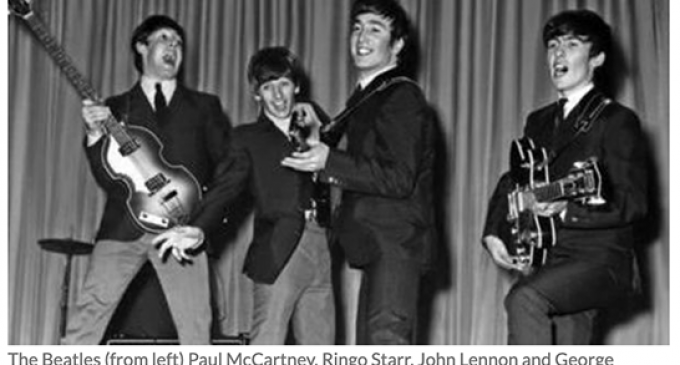Opinion | Bond, the Beatles and British culture’s last glorious sunrise

On certain days, the stars are in some mysterious alignment. Like 5 October 1962, when two unconnected events took place, which would have massive and everlasting global impact. It was the day the first Beatles single Love Me Do and the first James Bond film Dr No were released.
The Beatles are, without doubt, the most influential music band of all time. And, it is estimated that 20% of the world’s population has watched at least one Bond movie. Yesterday, the most covered pop song ever, has been sung by people as diverse as Elvis Presley, Aretha Franklin, Placido Domingo and Boyz II Men. And, of course, Bond keeps going on and on, with the 25th official film, No Time To Die, set to release this year.
By 1962, the Beatles—comprising John Lennon, Paul McCartney, George Harrison and drummer Pete Best—had a loyal fan following in their native Liverpool, but were largely unknown elsewhere. Their manager Brian Epstein approached George Martin, boss of the Parlophone label at music giant EMI, with a demo tape, and Martin called the Beatles for an audition. He chose Love Me Do among the songs the band played for him, only because it sounded to him a bit like some current hits. But his one condition for signing them on was that Best had to go—he did not like his drumming. The other three Beatles chose career over friendship. Best, who, incidentally, was perhaps the most popular Beatle in Liverpool, was sacked. EMI signed a scrimpy one-year contract with the band, with a royalty of one penny per double-sided record.
Love Me Do was recorded with a studio drummer, and then again, with the band’s new drummer Ringo Starr. When the song was released on 5 October, EMI did little to promote it, but Liverpudlian fans sent in hundreds of requests to radio stations to play the song. In December, it reached No. 17 on the UK hit list. Martin’s instinct told him that the band could be successful if he chose the right songs for it. He decided on Please Please Me, which shot to No 1. Quick to spot an opportunity, Martin moved fast. He put the boys through a 13-hour session to record their first album, which included I Saw Her Standing There and Twist And Shout. And Beatlemania was born.
Ian Fleming had been producing a Bond novel a year since 1953, and had been eager to see his hero on the screen. But deals kept falling through. Even Alfred Hitchcock had shown interest, but nothing happened. By 1960, he was desperate enough to sell an option on all current and future books to wannabe Hollywood producer Harry Saltzman for $50,000, with the promise of big payoffs per movie. But Saltzman got nowhere. Then, with only 28 days left on the option, a friend told him about London-based producer Albert Broccoli. Broccoli and his partner Irving Allen ran a successful production house. Broccoli had had a Bond film series in mind for years, but Allen had been nixing the idea. In fact, in one of the worst moves ever in film history, he quit when Broccoli agreed to partner Saltzman on Bond.
Broccoli contacted United Artists (UA), and miraculously, UA president David Picker was among the few American fans of the novels (Bond really went big in the US a few months later, when presidential candidate John F. Kennedy, in a TV interview, said he loved the books). UA signed up, but committed only $1.1 million for the first movie. Dr No, the sixth novel, was the producers’ choice. But screenwriter Wolf Mankowitz insisted on playing it as a spoof and made Dr No, the evil scientific genius, into a monkey on the villain’s shoulder. The producers were horrified and Mankowitz quit. The script reverted to the Fleming model.
Broccoli and Saltzman were clear that Bond should not be played by a star. They wanted an actor who brought no baggage or audience expectations with him, and chose Sean Connery, a former milk van driver, who had appeared in minor roles in a few movies. Friends jeered about casting a Scottish truck driver as an Eton-educated English spy. But the producers wanted exactly that—a brute in a Saville Row suit.
Critical response to the film was mixed, but the Vatican condemned it as “a dangerous mixture of violence, vulgarity, sadism and sex”. This only helped Dr No at the box office. In its first run, it grossed $6 million. Thus, the franchise began on a highly profitable note, and there was no looking back ever. Till date, the films have raked in more than $16 billion, adjusted for inflation, and this does not include huge incomes from television and music rights, product placement deals and spin-offs.
Both cultural phenomena took a sardonic note of each other pretty early on. In Goldfinger (1964), Bond tells Jill Masterson: “My dear girl, there are some things that just aren’t done, such as drinking Dom Pérignon ’53 above a temperature of 38 degrees Fahrenheit. That’s as bad as listening to the Beatles without earmuffs!” The Beatles responded a year later, in their film Help!, by parodying the Bond theme music. No one minded. And no one noted the date, 5 October. Since then, British influence on global culture seems to have waned. That day marked the beginning of a glorious last hurrah.
Sandipan Deb is a former editor of ‘Financial Express’, and founder-editor of ‘Open’ and ‘Swarajya’ magazines
Source: Opinion | Bond, the Beatles and British culture’s last glorious sunrise




There are no comments at the moment, do you want to add one?
Write a comment